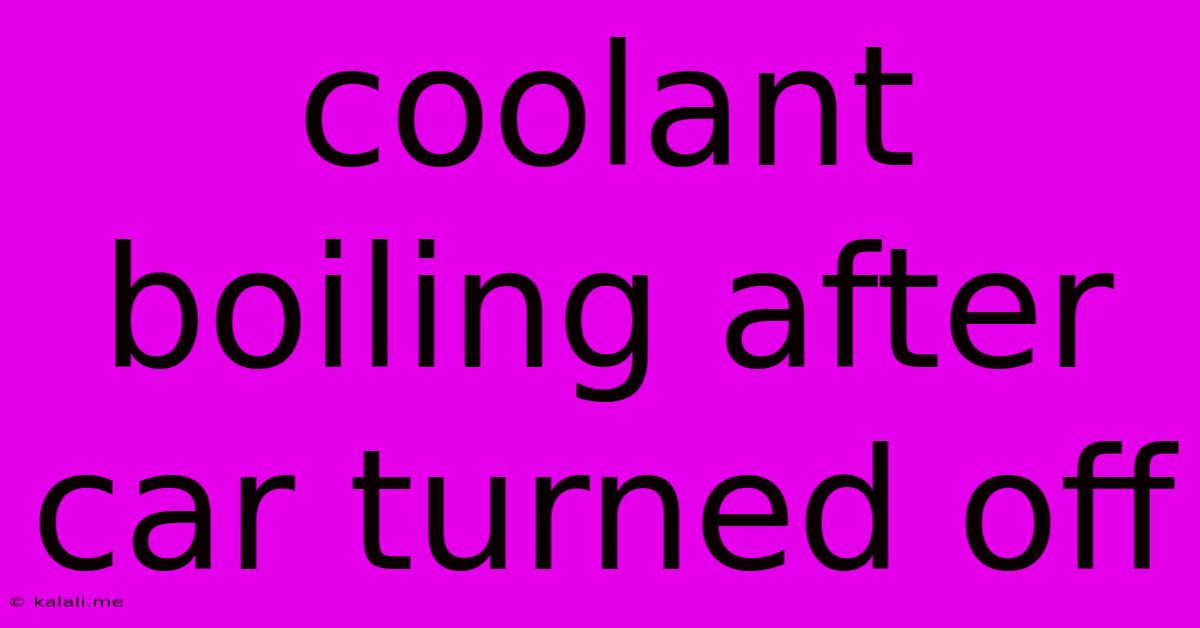Coolant Boiling After Car Turned Off
Kalali
Jun 01, 2025 · 4 min read

Table of Contents
Coolant Boiling After Car Turned Off: Causes and Solutions
Have you ever experienced that unsettling moment after turning off your car, only to hear a gurgling sound followed by the sight of steam rising from your engine compartment? Coolant boiling after the car is turned off is a serious issue that shouldn't be ignored. This article delves into the common causes of this problem, helping you understand why it happens and what steps you can take to address it. Ignoring this issue could lead to significant engine damage, so prompt action is crucial.
Understanding the Problem
When your engine coolant boils after the engine has been switched off, it indicates an overheating issue that persists even after the heat source (the engine) is no longer actively generating heat. This isn't a normal occurrence; a healthy cooling system efficiently dissipates heat while the engine is running and continues to cool down gradually afterwards. The boiling signifies a problem within the cooling system itself.
Common Causes of Post-Shutdown Coolant Boiling
Several factors can contribute to coolant boiling after the car is turned off. Let's examine the most prevalent ones:
1. Low Coolant Levels:
- Explanation: Insufficient coolant means less liquid to absorb and dissipate heat. This can lead to overheating, even after the engine is off, as residual heat continues to build up. This is often accompanied by a noticeable drop in coolant level in the reservoir.
- Solutions: Check your coolant level using the reservoir's markings. If low, carefully add the correct type of coolant (check your owner's manual). Address any leaks if found.
2. Faulty Water Pump:
- Explanation: The water pump circulates coolant throughout the engine block and radiator. A malfunctioning pump prevents efficient heat transfer, causing the coolant to overheat and boil even after shutdown. You might notice a weak or unusual pump sound.
- Solutions: A faulty water pump requires replacement. It's crucial to diagnose this properly as other issues can mimic its symptoms.
3. Clogged Radiator:
- Explanation: A radiator clogged with debris, rust, or scale restricts coolant flow, hindering heat dissipation. This reduced flow can cause overheating and subsequent boiling after the car is turned off.
- Solutions: Flush the radiator using a specialized cleaner to remove the obstructions. You might need a professional to perform this task efficiently.
4. Faulty Thermostat:
- Explanation: The thermostat regulates coolant flow. A stuck-closed thermostat prevents coolant circulation, leading to overheating. Conversely, a thermostat that remains open might allow the coolant to cool too quickly and not reach optimal temperature during operation.
- Solutions: Replacement of a faulty thermostat is the solution. This is relatively straightforward for DIY enthusiasts, but a professional can also handle this.
5. Head Gasket Failure:
- Explanation: A blown head gasket allows combustion gases to enter the cooling system, increasing pressure and causing the coolant to overheat and boil. This often presents additional symptoms like white smoke from the exhaust, milky oil, or loss of compression.
- Solutions: Head gasket replacement is a major repair. Professional intervention is almost always necessary for this task due to its complexity.
6. Radiator Cap Issues:
- Explanation: A faulty radiator cap can fail to maintain the correct system pressure. Low pressure can lead to overheating and boiling, especially after the car is switched off. A damaged or weak cap can result in coolant leaks.
- Solutions: Replacing the radiator cap is a simple fix, but ensure you replace it with the correct pressure rating as specified in your owner's manual.
7. Cooling Fan Problems:
- Explanation: A non-functioning or faulty cooling fan fails to adequately draw air through the radiator, leading to insufficient cooling even after the engine has been switched off.
- Solutions: Diagnose the fan; issues can range from a blown fuse to a failing fan motor. Replacement of the cooling fan motor or related components may be required.
Taking Action
If your coolant boils after turning off your car, don't delay. Address the issue promptly to prevent more serious engine damage. Starting with a visual inspection for leaks, checking coolant levels, and investigating potential causes listed above is crucial. If you're not comfortable diagnosing and repairing the issue yourself, seek the help of a qualified mechanic. Ignoring this warning sign can lead to costly engine repairs down the line.
Latest Posts
Latest Posts
-
This Is Her Or This Is She
Jun 03, 2025
-
How To Change A Spiral Notebook Cover
Jun 03, 2025
-
How Do I Clean A Glass Top Stove
Jun 03, 2025
-
Mix Ratio For 0 Psi Psi
Jun 03, 2025
-
Once Upon A Time In America Ending Explained
Jun 03, 2025
Related Post
Thank you for visiting our website which covers about Coolant Boiling After Car Turned Off . We hope the information provided has been useful to you. Feel free to contact us if you have any questions or need further assistance. See you next time and don't miss to bookmark.